Despite the negative effects of clutter, I’m fascinated with why most of us don’t prioritise removing clutter from our lives.
I’ve personally experienced incredible benefits as a result of applying minimalism. But perhaps my experiences alone are not enough to convince everyone to read this to declutter.
I get it. It’s not exactly fun (well, for most of us) to deal with our things. But it doesn’t mean we should continue to accept our current situation.
So I thought to spend the last week as a student scanning and dissecting white papers to find the negative effects of clutter.
And no, this is not an essay. It’s a blog post. I’ll be sure to break down this research in a digestible format.
Unsurprisingly, I found that clutter can have quite the effect on our stress levels, overall health and productivity.
Hopefully, after seeing the results from these studies, you’ll finally have the motivation to take action!
But before I go into my findings, let me give you a quick refresher on the definition of clutter.
What is clutter?
In a research paper titled: The dark side of home: Assessing possession ‘clutter’ on subjective well-being, clutter is defined as an overabundance of possessions that create chaotic and disorderly living spaces.
As it relates to minimalism, clutter is anything unnecessary—physical or non-physical.
This is where things get philosophical because how do we determine what’s necessary or unnecessary? I’ll save the answer for another blog post 🙂
So clutter is all of your physical possessions that are lying about without any order. It’s interesting, though, because we naturally crave order.
Look at the human body, for instance. Our cells, tissues, organs, fluids work together like a well-oiled machine. When our body is not operating in an orderly manner, we get ill or die.
So if we need to order internally, it’s only natural for us to seek orders externally. Well, you’d think so.
As economies feed off our consumerism, obtaining more things becomes the goal in life. It feels safer to have more than you need. It’s why we overpack when travelling, or overcook when preparing food.
More = success = safety.
Then, once we accumulate possessions, we do our darnedest to keep them—whether they’re adding value to our lives or not.
But at what cost? Let’s investigate using two case studies.
Negative effect #1 – Elevated levels of cortisol
Cortisol is a stress hormone produced by your adrenal glands. As this article explains it, think of cortisol as your body’s built-in alarm system.
It works with your brain to control your mood, motivation and fear. It’s best known for helping us deal in times of crisis. However, cortisol is also responsible for:
- Blood sugar regulation
- Inflammation reduction
- Metabolism regulation
- Memory formulation
If your body alarm is on all the time, it’s going to throw all of your regulators out of whack. As a result, imbalanced cortisol levels can significantly impact your overall health, including:
- Weight gain
- Stress
- Depression
- Anxiety
- Sleep
- Memory loss
- Headaches
- Heart disease
- Acne
So yeah, cortisol is a big deal, and it’s not something to take lightly.
What’s the right amount of cortisol?
Without going into too much detail, our brains can sense if we have the right amount of cortisol in our blood. If the levels are too low, the brain sends signals out to produce more.
Our adrenal glands (located on top of our kidneys) pick up on these signals and increase hormone production. Cortisol receptors, which are found in most cells, pick up the hormones and use it as needed.
For example, when your body is on high alert, cortisol can alter or shut down digestive and reproductive systems that are getting in the way. It’s also responsible for injecting more glucose into your brain.
Cortisol levels are at their highest first thing in the morning within the first hour of awakening, declining significantly over morning hours, then tapering off throughout the rest of the day before going all the way down before we go to sleep at night.
Image reference: How to Balance Your Cortisol Levels
The correlation between clutter and elevated cortisol
To understand the relationship between clutter and increased cortisol levels, I’m going to reference a study called No Place Like Home: Home Tours Correlate With Daily Patterns of Mood and Cortisol by Darby E. Saxe and Rena Repetti.
The researchers analysed 30 middle-class dual-income families living in large U.S. cities. Data was collected through videotaping, physiological questionnaires, and saliva sampling to test cortisol levels throughout each day.
Wives who described their homes as cluttered and more stressful had flatter slopes of cortisol throughout the day, an indicator of chronic stress and all of the other health problems associated with it.
Get this—some women put off coming home from work because they didn’t want to deal with their clutter! They viewed clutter as a constant reminder of incomplete tasks, and as a result, women, in particular, find it very hard to relax when they get home.
In contrast, wives who described their homes as restorative clutter-free environments had steeper cortisol level slopes. They showed signs of relaxation and decreased depressed mood throughout the day.
Ironically (or ahem, not so ironically), there wasn’t the same correlation between elevated cortisol and clutter found in the husbands in the study. This is not to say that clutter has no negative impact on men (more on that later).
But generally speaking, the wives felt more shame, guilt and frustration living in a cluttered environment than their husbands.
The study concluded that perceiving one’s home as cluttered or unfinished could directly trigger stress reactions and depressed mood, whereas viewing the home as more restorative might alleviate negative states.
Negative effect #2 – Disrupted focus
To understand how clutter disrupts our focus, we first need to look at bottom-up and top-down processing as it relates to our perception.
Bottom-up processing is stimulus-driven. We develop our perception based on sensory data, e.g. sight, hearing, touch, scent and taste. In other words, we are assessing the content purely as our sensors perceive it.
Let’s say you go to your favourite cafe to grab a cup of coffee. Your perception of the coffee you ordered is based on how it smells, tastes and looks. If the coffee is too hot, too sweet, or too small, you’ll develop your perception accordingly.
Top-down processing is context-driven. We develop our perception based on our goals, expectations and previous experiences.
Let’s go back to the coffee example. Your perception of the coffee you ordered would be dependent on whether you’ve had coffee from this cafe before, if you intended to order a cup or a mug, and how this coffee will make you feel to start your day.
According to the study Interactions of Top-Down and Bottom-Up Mechanisms in Human Visual Cortex by Stephanie McMains and Sabine Kastner, bottom-up and top-down processes compete with each other when processing visual stimuli.
This has some severe implications on our ability to focus.
When focusing, our brain is trying to filter out extra stimuli (bottom-up) and focus on what we’re trying to achieve (top-down) at any given time.
For example, it requires a lot of top-down processing for me to sit down and write this article. I’m making many assumptions, connecting dots and setting goals for each section.
However, when I write, I’m presented with varying degrees of physical clutter within a few metres radius from where I’m sitting.
While focusing on this article, my brain also processes everything I can see next to my computer, random noises and smells.
The more stimuli in my environment, the more bottom-up processing is required, thus stealing my attention away from top-down processing.
The fewer stimuli in my environment, the more capacity I have to focus.
Other examples include noticing mail on the kitchen counter when trying to cook a new recipe.
Or notifications are going off on your phone when you’re trying to read a novel.
I can relate to the challenges of competing processes, as my ability to focus is much easier when I have fewer stimuli to distract me.
In a culture that celebrates multitasking, think about what we could do if we gave our bottom-up processing a break? We would be more reflective, creative and set meaningful goals. And it all starts with clutter.
Read more: 10 Highly Effective Habits To Create a Distraction-Free Environment When Working
Other negative effects of clutter
The impact of clutter on our cortisol levels and focus are just a few of the many adverse effects of clutter. Other examples I came across include:
- Increased dust in your environment, therefore, affects your respiratory system.
- Studies have drawn links between procrastination and indecision with clutter.
- Cluttering may also trigger coping and avoidance strategies like eating junk food, binge-watching Netflix, and oversleeping.
Then there are more obvious examples like the inability to find things or not being able to use space that would typically be available.
With so many negative effects of clutter, it wouldn’t surprise me by now that you’re starting to feel a little overwhelmed. And to that, I say, good! That’s what I was hoping for 🙂
The problem with decluttering is that it’s super easy to put off doing.
If you didn’t think that clutter wasn’t impacting your life, or you know of the effects, but are procrastinating to take action, hopefully, this post has motivated you to do something.
Do you recognise the negative effects of clutter in your life?
Now I want to hear from you. If you’ve successfully gone from clutter to clutter-free, do you remember what pushed you to take action?
And if you haven’t started decluttering, what examples above resonated with you the most?
I look forward to reading your responses in the comments below.
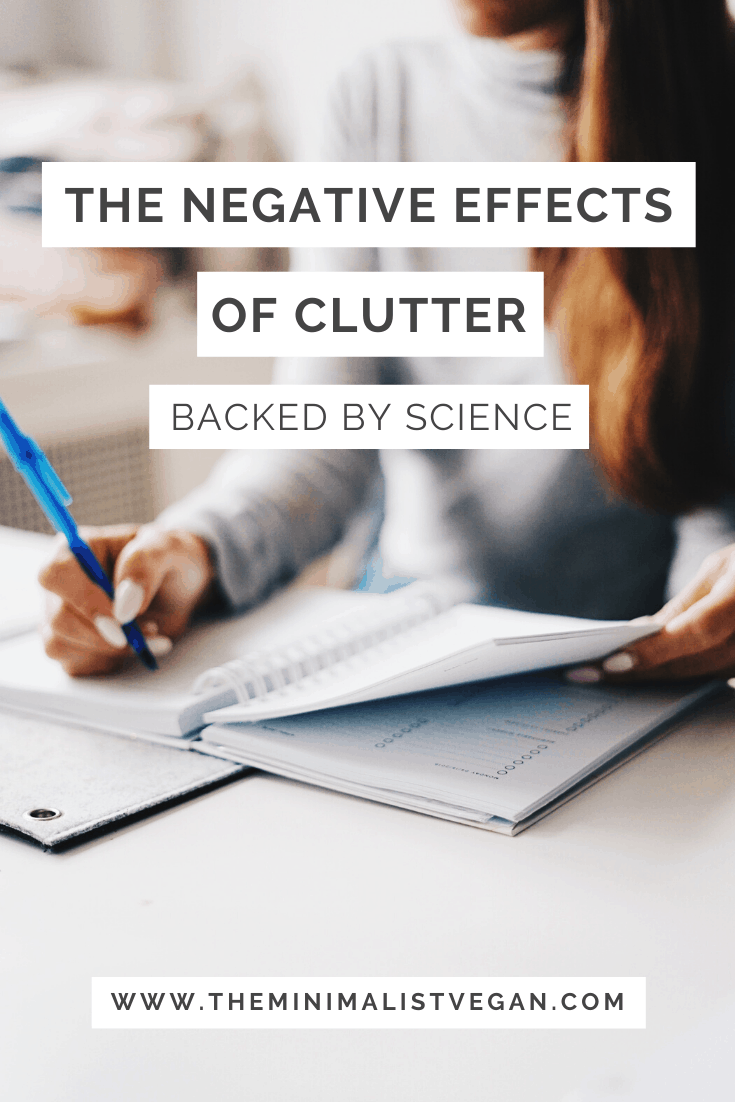

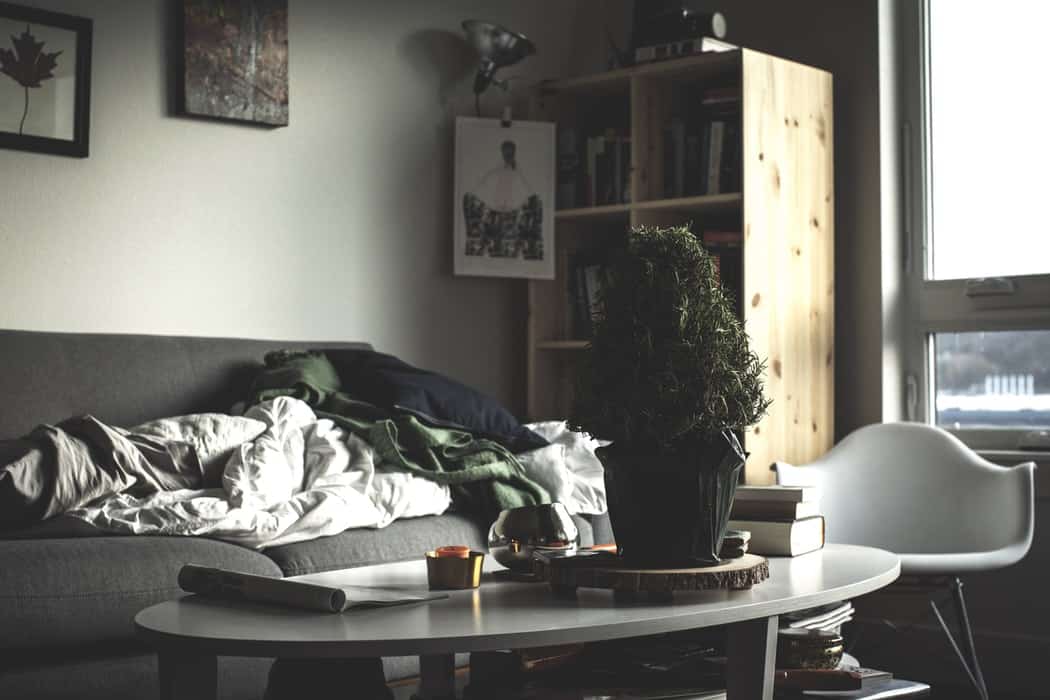
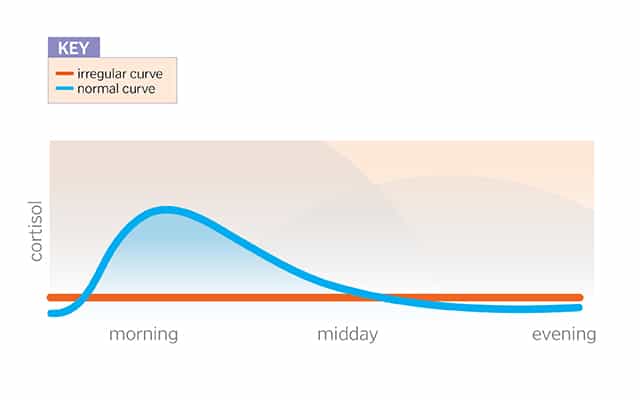
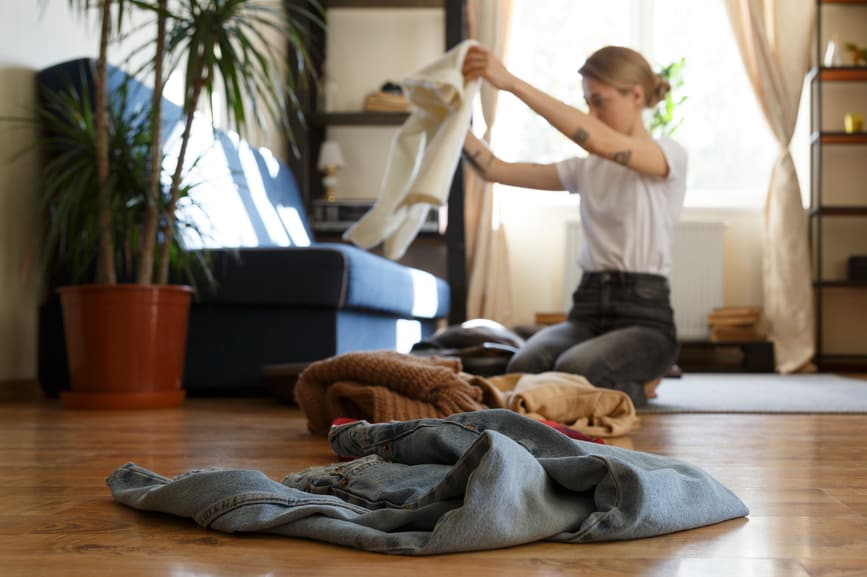
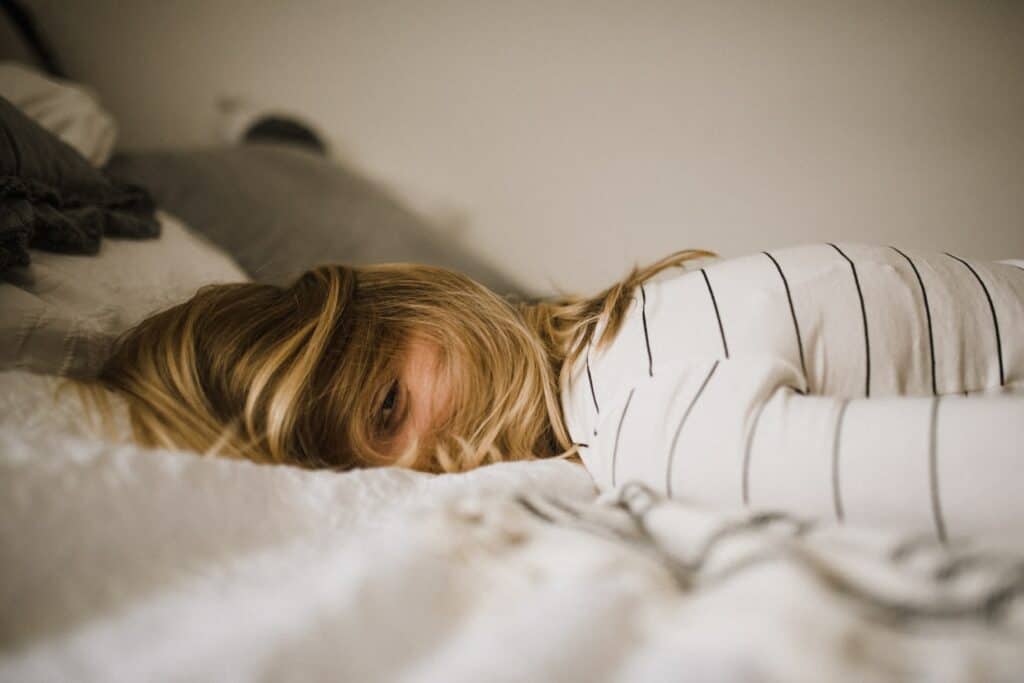
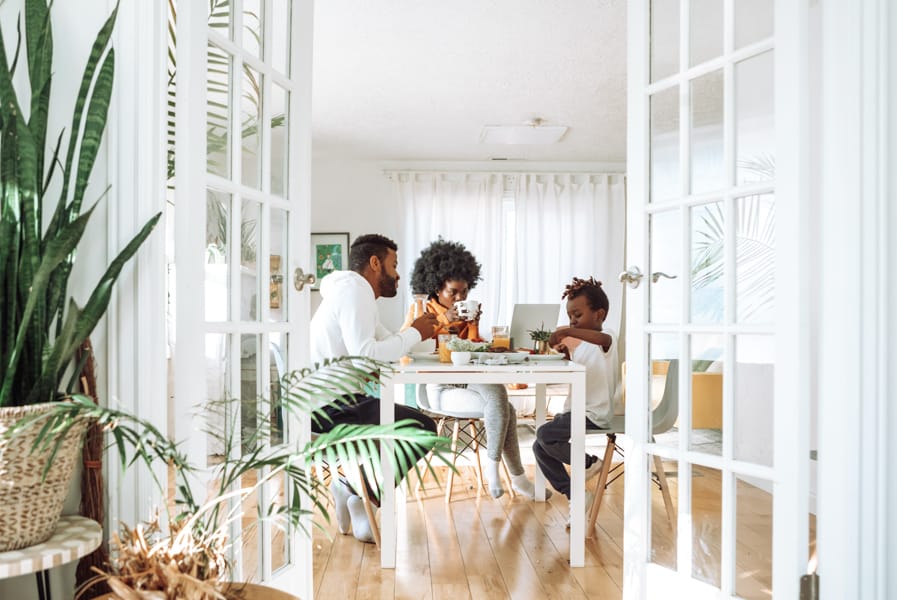
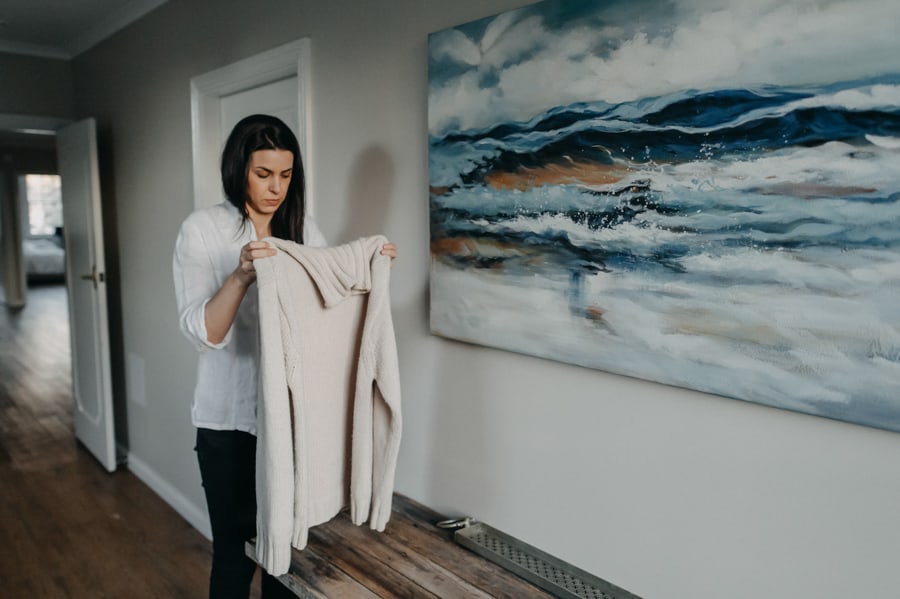
I am in the process of decluttering my life. I just went through a box of mail that I’ve been moving around with me from place to place for 7+ years, and it was absolutely healing and freeing. I related to the wives in the study mentioned in this article who viewed the clutter as unfinished tasks that needed to be addressed but unfortunately “not today, or the foreseeable future” because it requires so much time and thinking, which is a thought that adds even more stress. However, I’m at my tipping point as I am moving on to a new phase in my life where certain things of the past need to vanish, so that I can level up physically (outside and inside), digitally, mentally and spiritually.
Hi Latreil, I have no doubt the changes you’re about the make will create a new canvas for the next phase in your life. Thanks for sharing your experience and all the best!
My parents were born during the great depression. They were raised in a small community in the south where they were taught to work and be creative with what was on hand. Nothing was ever wasted or thrown away because it might have purpose. Growing up with two very productive/hardworking parents, my siblings and I were taught to follow suite. As a result the four of us have had our own issues with collecting and saving things. We each have had to cope with letting go of “things”. I am overwhelmed with what I have and it causes stress for my family. You and others are saying those things I wake saying to myself daily. I am encouraged!
Exactly. Thanks for the reminder! Clutter free feels so new, so Zen. Spring is my favorite time to have a major de-clutter session. 🙂
You’re welcome, Owen 🙂
I’m mum of 2 under 2. Toys prams bottles(- even tho we used only 2 on each of my children and it was just enough) milk Bibs clothes bla bla.. proper over whelming stuff. I noticed my doughter just emptying everything in a middle of a room(toys) and then looking for pans forks bags etc to play with. And I was feeling very stressed and everything over a mess we are living with. So over week ago I started ordering books etc to help me out and honestly.. we vegans for 3.5years now but minimalism.. oh I’m taking it closer to my heart than ever. Since I hiden half of her toys she still plays with little what’s left and we all happier bcos I have time to play with kids instead of cleaning!
Brilliant article. I massively decluttered last year when downsizing, but still have way too much stuff: books and papers…. the info in the article about the stress and distraction of clutter was challenging/good to know.
I’m glad you found this article helpful as you look to finish off you’re decluttering efforts. Great progress by the way!
I think minimalism is wonderful for those who live alone, renters, small home dwellers, or with housemates on board. When you live with others, it’s not a simple five step process to cull through things. Often I choose relationship sanity over a half empty shelf. The ability to maintain focus while getting rid of things can be difficult for many. I have had wonderful, rich friendships with hoarders and dealt with an incompetent supervisor with a neat office because so many important things were “accidentally” thrown away to keep the desk uncluttered. I’ve had regrets after throwing away sentimental photos and have electronically lost photo images over the years of many experiences. The cost and hassle to repurchase items, often of lower quality than the item donated, recycled or trashed, is frustrating. There is a need for better room design in homes, as I think about my “pizza delivery” eat-in kitchen. I call it that because the counter space is minimal and storage is poorly designed. I mention this as there are bloggers advising to keep items put away out of sight, but if your home doesn’t have an office or a garage, for example, you make do. As a lifestyle vegan living with family not vegan, we have two types of food in the kitchen and different hygiene/grooming products. This is also not minimalist. As I’ve had training in mental health, I understand how clutter can elevate stress levels. Having the feeling of being in control is important as well. Thank you for letting me share my thoughts!
Hi Rhea, you make some valid points regarding how hard it can be to live clutter-free with others who may not share the same mindset. I’m experiencing this now as we’re not currently living in our own environment. I’m presented with much more clutter than I’m accustomed too, and it’s quite challenging. But as you said, we must find a balance to accommodate others. Thanks for sharing your experiences with us.
Great article. Nice to hear about the science behind my madness (as some call me)?. I’ve been a minimalist for over 10 years. For me Even as a teen I was never a messy person but the older I got the more calm I needed in my life. Physical clutter created internal chaos for me. At beginning I just felt excess furniture needed to go to create more space (for my mind) and keeping my cupboards neat and half empty made me feel less chaotic. Over those 10 years back when I first found Minimalism in my life I started feeling more calm and peace in my life so then I started culling every inch of my entire life bit by bit, including a divorce, (not necessarily recommended for most?) , sold my extra large house moved semi rural smaller home with Mountain View’s. I culled my home, my schedule , my phone apps my wardrobes, my mind and my finances. It’s been an amazing ride to live in calm & peace for past 10 years (I’m now 46). And over those years I’ve managed to create a lifestyle where I get to work my own hours in my Business all thanks to Minimalism and being intentional.
I’m glad you enjoyed the article, Karena! Wow, what incredible intentionality you’ve applied to your life. I’m not surprised that you feel calm and peaceful after the decisions you’ve made. Thanks for sharing with us 🙂